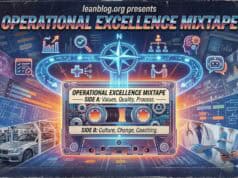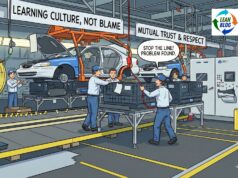Thanks, as always, to Ryan McCormack for this. He always shares so much good reading, listening, and viewing here! Subscribe to get these directly from Ryan via email.
News, articles, books, podcasts, and videos about how to make the workplace better.
Operational Excellence, Improvement, and Innovation
How About a Nice Hot Cup of Basics
I've been a Starbucks customer for over 30 years. There was a notable shift within the last 10 years where they changed significantly. What was once a cafe with high-quality products and services delivered with an engaging style became a primary drive-thru or drive-by mobile business. Recently, Mark Graban, another long-time Starbucks customer, recently shares his frustrations with the mobile fulfillment process.
Now, new CEO Brian Niccol, shares a clear message to Starbucks about getting back to basics: empowering employees, delivering high quality consistently, and bringing back the cafe setting. I applaud the CEO for delivering such a clear message to all employees. The basics may be boring, but they're foundational.
Safety Begins at The Top, and Belongs at the Top – Still
Safety. Quality. Delivery. Cost. In that order.
Investigations into a couple of spectacular safety failures, Boeing 737 MAX and the Titan submersible tragedy, remind us that safety culture starts with unwavering commitment from the top with safety being prioritized above all. The chair of National Transportation Safety Board reminded Boeing's new CEO that they have a safety culture problem with a workforce that “is afraid of retaliation”, acknowledging that the CEO “listened”.
Meanwhile, ex-employees of the Titan Submersible company testified at a Coast Guard hearing that an engineering director was fired for refusing to approve an expedition because he deemed the hull unsafe, and that the company's founder was dismissive of efforts to comply with certification and regulatory standards.
Cut Hospitals Some Slack
Ultra-high levels of utilization are the problem, not the goal. I observed first-hand the transition to remove any and all slack in hospitals throughout the 2000s in Canada, as inpatient beds were reduced in the belief that in-hospital care was too expensive and that patients are best treated in other settings such as primary care or at home. The problem? The capacity outside of the hospital never materialized, resulting in bed utilization regularly exceeding 100%, keeping the system in a state of semi-permanent gridlock to this day.
Where I live, Manitoba, the government is adding a few beds back to the system, which is good news, but probably insufficient to relieve the congestion in Emergency departments. Senior leaders fret over wait times, long lengths of stay, and bed utilization, and play elaborate games of gridlock whac-a-mole without generating any sustainable improvements. But the truth is that hospital systems (and any system for that matter) need slack, and utilization factors close to 100% mean you will always be simply managing crises. Indeed a recent study shows that high levels of utilization result in patients staying longer in the system followed by expediting practices where patients receive fewer procedures and faster discharge, in attempts to clear the system.
You can run a system at its maximum capacity for a little while, here and there. But keeping it that way steady for 20 years is irresponsible.
Creating a Culture of Improvement
Don't Pit Your People Against Each Other And Expect Them to Share Their Good Ideas
I once worked for an organization that force-ranked its employees and highly incentivized competition between peers. The stakes would get pretty high as top-ranked performers would get considerable bonuses. Part of the scheme included a requirement to document and share any innovations that helped you get better results. I remember frequently getting chastised for failing to record my projects in the central database, but there was a simple reason I didn't. Why would I share my good idea only to have a peer outperform me and potentially lose my bonus? Creating internal employee competition may be good at getting people to work harder, but it's lousy for sparking and sharing innovation.
Error is Normal
Embracing error as “normal” is a foundational principle for moving from a culture of blame to one of curiosity. This should not be misconstrued as being accepting of errors or fatalistic, but rather recognizing that errors should be met with a desire to drive learning rather than one to be feared for reporting.
The Role of Chaos in Innovation
“Corporations are optimized for scaled execution, not learning. Leaders of corporations need to develop an entirely different system of governance, incentives, and processes that is designed to foster learning.” Innovation expert and entrepreneur Elliot Parker shares how a certain level of error-making, chaos, and anomalies are necessary to create moments of innovative serendipity.
Coaching – Developing Self & Others
The Robot Coaches Are Here, And I Feel Fine
Coaching has had a profound impact on my career. Having access to a skilled coach is a luxury, and if you were one of the lucky few to get access to valuable time you had a leg up on others. But what if everyone could have access to a skilled and personalized coach?
Enter AI and Digital Coaching. The last several years have seen many new entrants into the digital coaching space, and with AI at the peak of the hype cycle, many are considering it as a useful capability for their organization. I once considered the idea of digital coaching a little far-fetched (this made me think of a 2011 April Fool's joke about a “virtual sensei”). I remain skeptical but open. If quality and effective outcomes can be demonstrated, then democratizing access to coaching sounds like it could be a good thing.
Follow Ryan & Subscribe:
LinkedIn: https://www.linkedin.com/in/rjmccormack/
Subscribe to receive these via email
If you’re working to build a culture where people feel safe to speak up, solve problems, and improve every day, I’d be glad to help. Let’s talk about how to strengthen Psychological Safety and Continuous Improvement in your organization.








